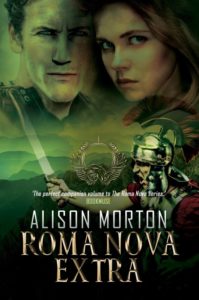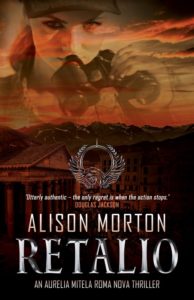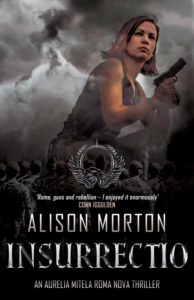ALISON MORTON'S ROMA NOVA
by Helen Hollick
Alison Morton writes a thriller series. But wait a minute - isn’t this supposed to be an Historical Fiction-based blog site? So why am I including 'thrillers'? Well, there are such things as thrillers and murder-mystery type novels set in an historical period - probably the most famous being another favourite of mine, Cadfeal.
But Ms Morton has created what is, I think, something unique for her novels, not thrillers placed in an historical setting – there are plenty of those of a good, middling or poor standard – but thrillers placed in an alternative historical setting.
Imagine, as she has so superbly done, if the might that was Rome, with its military and administrative expertise, had not collapsed here in the West in the fifth century. Imagine if sixteen hundred years ago a group of steadfast Roman exiles had given all they had to preserve 'Rome', from its language to its customs, to its gods and its ideals. The only thing to change, as the centuries wore on, were the leaders, the ones in charge. The women.
Morton’s Roma Nova series features modern twentieth and twenty-first century Praetorian heroines. With a few hunks of male heroes and a smattering of dastardly baddies thrown in for good measure. The result is a series of engrossing, intelligent, entertaining – and dare I say, thrilling – novels that have no respect for lights-out at bedtime, but an addictive and compulsory need to keep turning the pages to find out what happens next. Nor does the excitement leave at the end of each book. Thank goodness for Kindle where ordering the next in the sequence is instantaneous.
Morton’s passion for Roman history is evident, as is her knowledge of military matters. She spent six years in the UK military service and a lifetime of reading crime, adventure and thriller fiction. From an early age, Morton says; “I was intrigued by the role of female soldiers, probably influenced by a feminist mother and a father who was ex-military.” She saw no reason why women could not represent their country alongside men in the armed forces and joined the Territorial Army in the special communications regiment. She eventually finished her career as a captain, a career which included a variety of interesting, and some secretive things that she still cannot talk about. Which is, perhaps, as frustrating for us as it is for her, but highly valuable for a writer in need of conjuring up plots for exciting thriller novels based around a fictional military regime.
But Ms Morton has created what is, I think, something unique for her novels, not thrillers placed in an historical setting – there are plenty of those of a good, middling or poor standard – but thrillers placed in an alternative historical setting.
Imagine, as she has so superbly done, if the might that was Rome, with its military and administrative expertise, had not collapsed here in the West in the fifth century. Imagine if sixteen hundred years ago a group of steadfast Roman exiles had given all they had to preserve 'Rome', from its language to its customs, to its gods and its ideals. The only thing to change, as the centuries wore on, were the leaders, the ones in charge. The women.
 |
| Who is Carina Mitela the heroine... |
 |
| ... and a hunk of a hero |
A fascination as a child with the Ampurias mosaics in Spain and the wonders of Roman engineering kick-started her interest in Roman history, and in particular the role of women. The Roman Empire spread from small beginnings via a republic to an imperial regime with periods of political stability, expanding conquest and the most powerful economic, cultural and military force in the then known world, possibly only partially matched ever since by the Victorian era British Empire. Interspersed with this stability and expansion, however, were insane or power-lusting emperors, administrative chaos, bloody battles, scheming political intrigue, inter-family at top level squabbling and murder. Morton, however, began to wonder what a modern Roman society would be like if it had survived all that, and was run by strong, capable women… Tough, disciplined, dedicated heroines who had the guts and capability to deal with any or all of the issues of the past that could re-raise their ugly heads. Even the passing of centuries does not eliminate a lust for power and disrespect for the law to achieve it. A fact which Ms Morton uses well to her advantage.
From the striking original covers to the brand-new stunningly attractive ones, we get an immediate sense of the grandeur of Rome, and the very cleverly thought-out titles – Latin, but recognisable and pertinent to each story-line – the novels themselves whisk you into an entirely made-up imagined world, but one that is utterly believable and completely convincing in the locations, the plot, the characters and the action. But in layers beneath these adventures, she does more than merely entertain. Morton examines some eternal themes: power, betrayal, personal and political breakdown and the many facets of love. While not necessarily being pro-feminist, by using an alternative historical framework she prods us to consider that public agency in a historical environment – government, military service, open political power – is not always exclusively a male prerogative.
For the characters, we meet Carina Mitela, the heroine, in Book One, Inceptio in modern-day New York, although even here things are not quite as expected, for this is not the USA as we know it. This is the Eastern United States, similar but not the same; I personally find it fun to ‘spot the difference’ where Ms Morton has made subtle changes: Central Park is Kew Park, for instance, a nod to London’s Kew Gardens? At first you think she has made a mistake, then you cotton-on to her adept twists of what is ‘our’ world and her alternative Roma Nova existence. Very cleverly done.
 |
| Roma Nova? |
Here, though, at the start of this part of the series, our heroine is Karen Brown who finds herself suddenly plunged into confusion, kidnapping, threats to her career and life – and a meeting with an arrogant Roma Novan Praetorian special-forces officer, Conrad Tellus. Karen is forced to flee with him to the homeland of her deceased mother, Roma Nova, situated somewhere in Europe, roughly in our modern Austrian/Switzerland area, and finds herself re-established as Carina Mitela, the granddaughter of one of the most important administrative families. She enrols in the law enforcement service, but remains determined to discover who it is who wants her dead, and who is hunting her so ruthlessly. Romance, of course, comes into it via Conrad, known as Conradus on his own turf, and other dominant males.
Action, adventure, thriller, military precision: “The Hunger Games meets Lindsey Davis’s Roman detective Falco,” as one fan from a book club summed it up.

Action, adventure, thriller, military precision: “The Hunger Games meets Lindsey Davis’s Roman detective Falco,” as one fan from a book club summed it up.

Perfiditas, the next instalment follows on, with Carina risking being terminated by the security services and a variety of chilling conspirators. Her decision to seek help from a less-than-legal friend brings her close to wrecking her marriage and her career. There is betrayal, emotional decisions, loyalty and hard-gut determination in this novel. The true stuff of heroines and heroes.
Successio, Book Three, sees Carina working as an experienced officer in military intelligence – you can clearly recognise Morton’s own experiences in this particular book. Carina is given the task of protecting Roma Nova from a last remnant of the Empire that has survived into the twenty-first century, but to do so she must find the mental and physical strength to face her nemesis. And make some very hard decisions.

Successio, Book Three, sees Carina working as an experienced officer in military intelligence – you can clearly recognise Morton’s own experiences in this particular book. Carina is given the task of protecting Roma Nova from a last remnant of the Empire that has survived into the twenty-first century, but to do so she must find the mental and physical strength to face her nemesis. And make some very hard decisions.

With Aurelia, Book Four, the author not only surprises her readers but shows to full extent her magnificent talent as a competent and creative writer. She takes us back to the early 1960s and the story that lies behind Carina’s esteemed grandmother, Aurelia Mitela. Investigating silver smuggling, silver being one of the financial mainstays of Roma Novan survival, she clashes with Caius Tellus, a personal enemy since their childhood, and an enemy of Roma Nova, for through him the destruction of everything that has been established looms immanent.

The story continues to a breath-taking, heart-pounding climax as a trilogy through Insurrectio and Retalio. Yes, you know that Aurelia will eventually win the day, she has to for she is there in the first three books set several years after this trilogy, but it is her journey, her fight, her courage, that is important here. Morton’s skill at pulling off such an engrossing set of classy thrillers to entirely absorb, gasp at, cheer at and ultimately, at the last page, to whole-heartedly applaud, is, to use a common phrase, awesome.

The story continues to a breath-taking, heart-pounding climax as a trilogy through Insurrectio and Retalio. Yes, you know that Aurelia will eventually win the day, she has to for she is there in the first three books set several years after this trilogy, but it is her journey, her fight, her courage, that is important here. Morton’s skill at pulling off such an engrossing set of classy thrillers to entirely absorb, gasp at, cheer at and ultimately, at the last page, to whole-heartedly applaud, is, to use a common phrase, awesome.
But we do not have to stop there! Carina, is a novella set after Inceptio but before Perfiditas and focuses on Carina’s early experiences within Roma Novan society and law. She is an inexperienced officer in the Praetorian Guard Special Forces, and through folly, is disgraced and reprimanded for her undisciplined actions. To extricate her from embarrassment she is sent to the Republic of Quebec (Canada) to return a traitor to Roma Nova, but in true thriller adventure style, things do not go to plan.


And then there is Roma Nova Extra! A collection of short stories from the fourth century to beyond the present.

The Girl from the Market AD 370
Lucius Apulius, a young Roman military tribune, is posted to the back end of empire as Rome struggles to keep the barbarians behind the Danube. There, Apulius meets the fiery Julia Bacausa under most unusual circumstances.
Victory Speaks AD 395
In real history, the disappearance of the Altar of Victory is an ancient mystery.
Victory served as the pagan symbol of Rome’s endurance, the guarantor of the empire’s existence. But as the official imperial cult of Christianity swept all before it, Victory’s fate was condemned to historical obscurity. In the Roma Novan timeline, Victory herself tells us the story of how two senators and a small child step in.
A Roman Intervenes 1066
Galla Mitela, eleventh century imperial councillor, is sent by the imperatrix under pressure from the Eastern Romans of Constantinople to stop William of Normandy invading Saxon England. Could she have succeeded?
(Previously published as part of the 1066 Turned Upside Down collection)
Silvia’s story 1983
Re-building Roma Nova after Caius Tellus’s tyrannical rebellion is pulling on every Roma Novan’s personal strength and resources. Young Imperatrix Silvia devotes herself to her country, but she’s eighteen, exhausted and lonely. Sent by her councillor, Aurelia Mitela, for a few days’ holiday to the spa at Aquae Caesaris, she encounters a young Italian, Andrea Luca.
(Set just after the end of RETALIO)
Games (Set just after the end of INCEPTIO)
Newly minted Praetorian officer Carina Mitela and her buddy Daniel Stern, a seconded officer from an allied force, love challenges. Dangerous ones. It’s a game to them. But real life gives them a challenge that is anything but a game.
Conrad and Carina’s Roman Holiday (Set between PERFIDITAS and SUCCESSIO)
Legate Conradus Mitelus, commanding the Praetorian Guard, doesn’t get out in the field very often. Neither does his wife, Carina Mitela, a newly promoted Praetorian major. But a personal quest from the imperatrix sends them on their own ‘Roman holiday’. With a difference.
Saturnalia Surprise (Set after a few years after SUCCESSIO)
When Carina and Conrad’s son Gillius nearly blows himself up just before the Saturnalia winter holiday, he’s sent to Sextilius Gavro, Conrad’s ‘mad inventor’ cousin. Carina is dubious, having met Gavro in New York nearly twenty years before (INCEPTIO), but she is in for several surprises on the first day of Saturnalia.
Allegra and Macrinus (Set several years after SUCCESSIO)
Highly intelligent, efficient and dedicated to her career in the military, Carina and Conrad’s eldest daughter, Allegra, is losing her grip on her life. Her introverted character prevents her from acknowledging her feelings for a man she has known all her life, let alone doing anything about it. Macrinus has grown up in the Mitela household. His mother was a comrade-in-arms of Aurelia Mitela during the Great Rebellion and tells him Allegra is out of his reach.
There are several essentials that can turn a good book into a brilliant book (or a good series into a brilliant series). Obviously, good writing and good editing are two of these essentials, but for whatever the genre and sub-genre believability for the plot, the locations, the characters, indeed the entire package, is as essential. For her Roma Nova series, Alison Morton has created a cast of characters, various exciting adventures that befall them, and an entire fictional world for them to ‘perform’ in which, quite frankly, has left me open-mouthed with admiration. Nor does she pull any emotional punches. How on earth does Morton manage so consistently to write book after book to match, and outrank, the previous one for quality, continuity, thrills, spills and page-turning entertainment, again, and again and again? The answer is, without doubt, top-class writing skills, dedication, scrupulous attention to detail, in-depth research and books that are professionally produced from cover-to-cover.

The Girl from the Market AD 370
Lucius Apulius, a young Roman military tribune, is posted to the back end of empire as Rome struggles to keep the barbarians behind the Danube. There, Apulius meets the fiery Julia Bacausa under most unusual circumstances.
Victory Speaks AD 395
In real history, the disappearance of the Altar of Victory is an ancient mystery.
Victory served as the pagan symbol of Rome’s endurance, the guarantor of the empire’s existence. But as the official imperial cult of Christianity swept all before it, Victory’s fate was condemned to historical obscurity. In the Roma Novan timeline, Victory herself tells us the story of how two senators and a small child step in.
A Roman Intervenes 1066
Galla Mitela, eleventh century imperial councillor, is sent by the imperatrix under pressure from the Eastern Romans of Constantinople to stop William of Normandy invading Saxon England. Could she have succeeded?
(Previously published as part of the 1066 Turned Upside Down collection)
Silvia’s story 1983
Re-building Roma Nova after Caius Tellus’s tyrannical rebellion is pulling on every Roma Novan’s personal strength and resources. Young Imperatrix Silvia devotes herself to her country, but she’s eighteen, exhausted and lonely. Sent by her councillor, Aurelia Mitela, for a few days’ holiday to the spa at Aquae Caesaris, she encounters a young Italian, Andrea Luca.
(Set just after the end of RETALIO)
Games (Set just after the end of INCEPTIO)
Newly minted Praetorian officer Carina Mitela and her buddy Daniel Stern, a seconded officer from an allied force, love challenges. Dangerous ones. It’s a game to them. But real life gives them a challenge that is anything but a game.
Conrad and Carina’s Roman Holiday (Set between PERFIDITAS and SUCCESSIO)
Legate Conradus Mitelus, commanding the Praetorian Guard, doesn’t get out in the field very often. Neither does his wife, Carina Mitela, a newly promoted Praetorian major. But a personal quest from the imperatrix sends them on their own ‘Roman holiday’. With a difference.
Saturnalia Surprise (Set after a few years after SUCCESSIO)
When Carina and Conrad’s son Gillius nearly blows himself up just before the Saturnalia winter holiday, he’s sent to Sextilius Gavro, Conrad’s ‘mad inventor’ cousin. Carina is dubious, having met Gavro in New York nearly twenty years before (INCEPTIO), but she is in for several surprises on the first day of Saturnalia.
Allegra and Macrinus (Set several years after SUCCESSIO)
Highly intelligent, efficient and dedicated to her career in the military, Carina and Conrad’s eldest daughter, Allegra, is losing her grip on her life. Her introverted character prevents her from acknowledging her feelings for a man she has known all her life, let alone doing anything about it. Macrinus has grown up in the Mitela household. His mother was a comrade-in-arms of Aurelia Mitela during the Great Rebellion and tells him Allegra is out of his reach.
There are several essentials that can turn a good book into a brilliant book (or a good series into a brilliant series). Obviously, good writing and good editing are two of these essentials, but for whatever the genre and sub-genre believability for the plot, the locations, the characters, indeed the entire package, is as essential. For her Roma Nova series, Alison Morton has created a cast of characters, various exciting adventures that befall them, and an entire fictional world for them to ‘perform’ in which, quite frankly, has left me open-mouthed with admiration. Nor does she pull any emotional punches. How on earth does Morton manage so consistently to write book after book to match, and outrank, the previous one for quality, continuity, thrills, spills and page-turning entertainment, again, and again and again? The answer is, without doubt, top-class writing skills, dedication, scrupulous attention to detail, in-depth research and books that are professionally produced from cover-to-cover.
My only comment against Ms Morton is that she has no regard for permitting her readers to go to sleep at night, or notice the required stop on their bus or train travels. But then, the ability to engross your reader so deeply in a novel is a very fine talent, and Alison Morton possesses that talent by the bucket-load. Once discovered, her books are pounced on by her readers; her work is an exemplar of the current crop of high-quality independent self-published writers, a group that has well and truly established itself in the genre of historical fiction writing.
Buy on Amazon
Subscribe to Alison's Newsletter
Twitter @alison_morton
Facebook
Blog
Buy on Amazon
Subscribe to Alison's Newsletter
Twitter @alison_morton
Blog
© Helen Hollick
(Updated from an original article posted in March 2018 )










No comments:
Post a Comment
We do not accept comments. If you need to contact Discovering Diamonds go to the CONTACT facility
Note: only a member of this blog may post a comment.